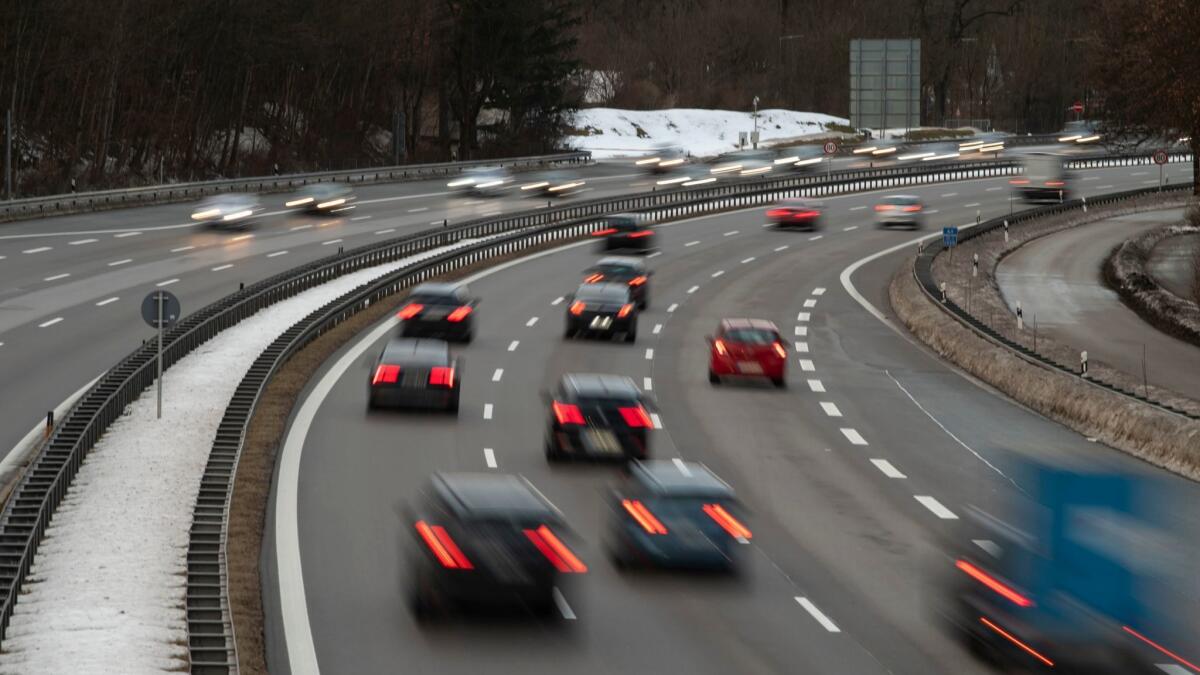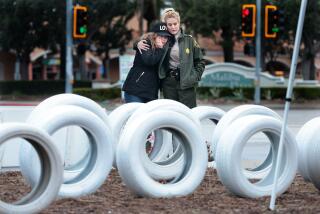California lawmaker wants to give the state its own high-speed Autobahn

Reporting from Sacramento — With the state hitting the brakes on the proposed bullet train project, one lawmaker has offered an alternative to get Californians quickly from north to south: expanding Interstate 5 and Highway 99 to install new lanes without speed limits.
Sen. John Moorlach (R- Costa Mesa) said Tuesday he wants California to have its own version of the German Autobahn on two lanes to be added in each direction on the pair of major north-south freeways.
His legislation, Senate Bill 319, would get work started on the new limit-free lanes on I-5 roughly between Lebec in the Grapevine in the south, and Sacramento or Stockton in the north using some of the hundreds of millions of dollars raised by the state’s cap-and-trade program, which requires companies to purchase credits if they pollute.
Moorlach said he was working on the proposal before Gov. Gavin Newsom proposed this month to scale back the high-speed rail project, noting that plan was already facing many years of delay.
“We are waiting decades for high speed rail to get finished,” Moorlach said. “Why can’t we build 300 miles of four-lane concrete in five years at a fraction of the cost, so people aren’t backed up behind trucks to get to San Francisco on the 5?”
“If they wish to use the autobahn lanes, we call it the high-speed road — they are going to get to their destination a little faster,” he added.
He said a car traveling 100 mph could make the trip from Stockton to the Grapevine in about two and a half hours in the proposed lanes.
The bill does not include an estimated cost to build hundreds of miles of new freeway lanes.
But based on one possible cost scenario, the project might cost $3 billion in cap-and-trade funding, said Moorlach, a former Orange County Treasurer-Tax Collector.
Moorlach’s proposal faces a rough road in the Democrat-controlled Legislature.
Although current Democratic leaders did not immediately respond to requests for comment, former Democratic Assemblyman Roger Dickinson raised doubts about the proposal.
“It would make more sense to invest in increased maintenance on Highway 99 and I-5 which suffer from significant deterioration due to extraordinary use, particularly from heavy-duty vehicles,” said Dickinson, executive director of Transportation California, a coalition of construction industry and labor groups. “Regardless of the merits of Senator Moorlach’s proposal, it would appear extremely difficult to justify the use of cap-and-trade funds for the project he proposes.”
Moorlach said the use of the funds is justified, noting that having cars sitting in idle traffic on freeways increases greenhouse gas emissions.
The maximum speed limit in California is 70 miles per hour, but Moorlach said the federal government has allowed other states to post higher speed limits. In Montana and Utah, the limit is 80 miles per hour on some roads, while Texas allows some drivers to travel at 85 mph.
Anticipating concerns about traffic safety on freeways without speed limits, Moorlach cited a World Health Organization study that estimated road traffic deaths per 100,000 people is 4.1 in Germany, but 12.4 in the United States.
Moorlach’s proposal comes just days after Gov. Gavin Newsom said in his first State of the State speech that he would consider scaling back the proposed $77-billion high-speed rail project.
Newsom said California has the ability to finish the first leg in the Central Valley, but that extending the rail line to Southern California and the Bay Area would “cost too much and, respectfully, take too long.”
The project, approved by California voters in 2008, promised to speed riders from Los Angeles to San Francisco in less than three hours.
Representatives for the California Highway Patrol and Caltrans said Tuesday the agencies do not comment on pending legislation.
Moorlach, who drives a 1996 Chevrolet Impala SS, said he would be among the motorists driving at 100 mph if his proposal comes to fruition.
“Why slow me down?” he asked. “On a clear day everyone is going 80 mph. These vehicles are technological wonders. They are built for high speed and we have no place in California to stretch them unless you are willing to break the law, and that doesn’t make sense.”
Twitter: @mcgreevy99
More to Read
Get the L.A. Times Politics newsletter
Deeply reported insights into legislation, politics and policy from Sacramento, Washington and beyond. In your inbox three times per week.
You may occasionally receive promotional content from the Los Angeles Times.











